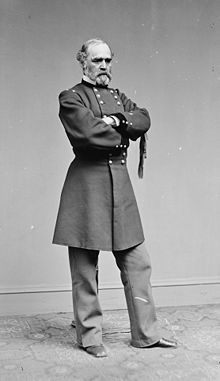 |
| General Montgomery C. Meigs |
QUARTERMASTER-GENERAL'S OFFICE,
Washington City, August 18, 1862.
Major General H. W. HALLECK,
Commanding Army of the United States:
GENERAL: There are some points connected with the supply of the Army of Virginia which require attention to enforce economy and prevent great losses of material. The colonel of a New York cavalry regiment, attached to the Army of Virginia, Colonel Davies, informed me a day or two since that his horses were in fine condition, efficient, and always had been so. This officer was engaged in the two expeditions to cut the railroad starting from Fredericksburg; once he cut it at Beaver Dam, and just before the battle of Slaughter Mountain he cut it at Frederick's Hall. His has done as much hard service probably as any other regiment under General Pope.
General Pope reports to you that the horses of his cavalry are much broken down, and never had been good for anything. In this latter I doubt not he is mistaken. Great care has been taken in purchase of horses, and this stock is I doubt not better than is generally found in armies. But the men are inexperienced as soldiers, and they destroy their horses by hard and unnecessary riding. The strictest rules should be adopted to prevent all riding faster than a walk, except when actual service makes it necessary. In this hot season a cavalry regiment may be broken down by a few days' improper use of their horses.
General Pope calls for more than 25,000 forage rations, 20 car loads of grain per day, and I am informed that his army refuses to use corn. The oat crop is light, and prices, which ruled last year at this time at about 40 cents per bushel, have now gone up to 70 cents. In view both of the great cost of oats and of the difficulty of transporting daily so large a supply (and the re-enforcements of this army are about to increase the difficulty), it is very desirable that the horses and mules be compelled to use to some degree the forage of the country in which they are operating. Residents of Culpeper report to you that there are large quantities of uncut timothy hay and of anthracite wheat in the county. Properly fed to the animals this fodder would certainly keep them in condition.
The transportation required by the regiments seems to me unnecessarily large. The army is burdened with the protection and supply of an enormous train, which clogs its movements and exhausts the Treasury.
I have not been able to compel regular reports of the state of this transportation, but I have from a quartermaster in General Sigel's corps the following statement: Regiments average about 550 to 600 men; brigades, four regiments, one battery, and one to three companies of cavalry. Each regiment has 15 wagons, drawn by four or six mules. Each brigade has a supply train in addition of 40 wagons, making an average of about 23 wagons to a regiment of 600 men. With this, I understood, they carry ten days' provisions.
Napoleon asserted that 500 wagons were enough for 40,000 men. We are using at the rate of three times this number.
I have been informed that shelter-tents have been issued to the Second Brigade, First Division, of General Sigel's corps, and that they have still retained three Sibley tent to each company. As the companies are not over 60 strong, and one Sibley tent to 20 footmen is the full regulation allowance, this brigade is transporting two complete sets of tents for its rank and file. How it is with other brigades I do not know. These tents are needed, and should be sent to the depot for issue to new regiments not yet housed.
If the army is to move with efficiency, rigorous measures must reduce this luxury of transportation. Can any one believe that Jackson's troops regularly receive 20 car loads of oats per day, or that they move with 23 wagons to each regiment of 600 strong, or that they have two sets of tents to a company?
After all its losses the Army of the Potomac had in camp on James River nearly 2,800 wagons, which was at the rate of 28 wagons to 1,000 men.
I am, very respectfully, your obedient servant,
M. C. MEIGS,
Quartermaster-General.
Official Records, Series I., Vol. 12, Part 3, Page 596.
On paper the Union forces always seemed, from early in the war, to enjoy decided advantages in numbers. But effectiveness always must be factored in and while supplies existed in abundance, there were points beyond which additional equipment was a hinderance. Meigs makes passing reference to Jackson, no doubt aware that the Confederate general moved much greater distances in a day than his opposite numbers while being much less well supplied. In fact, some would argue Jackson's lack of equipment worked at times to his advantage insofar as traveling light meant traveling farther and faster. Meigs was an able officer whose many contributions to the war effort as Quartermaster General cannot be understated. After the war he was instrumental in developing Arlington National Cemetery. He detested the Confederacy and Lee, who home was occupied by Union forces during the war. The establishment of the cemetery was within the scope of his duties, but the choice of site was also intended as an act of retribution against Lee.
No comments:
Post a Comment